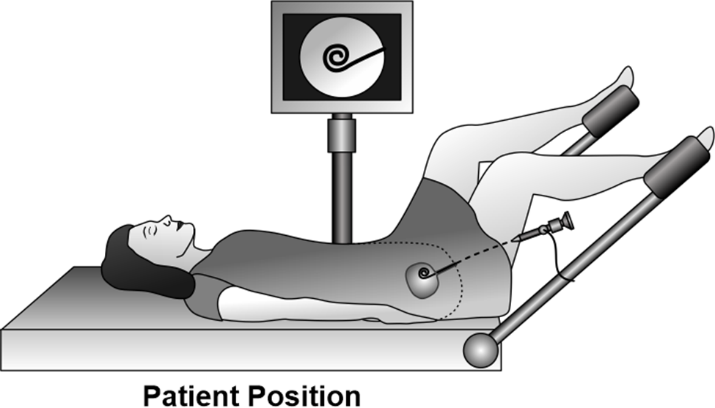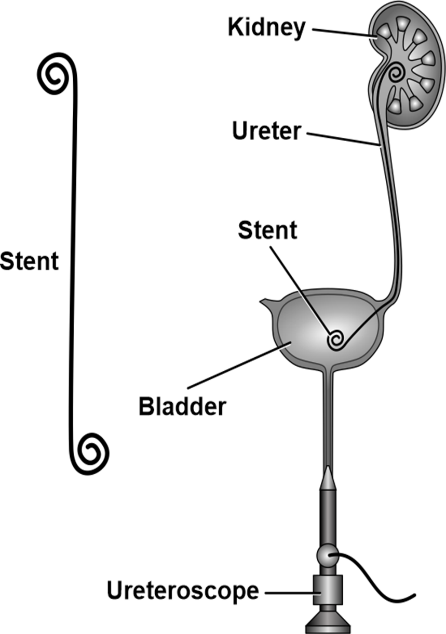Cystoscopy and Ureteral Stent Placement
What is a cystoscopy?
A cystoscopy (sis-Tos-kuh-pee) is a procedure that allows your doctor to examine the inside of your child’s bladder and the urethra (tube that carries urine out of your body). The cystoscopy is done as an outpatient procedure and your child will go home the same day. During the cystoscopy your doctor may perform an x-ray (called retrograde pyelogram) to look at the ureters (the tubes that drain urine from the kidneys to the bladder).
When will I need a cystoscopy?
A cystoscopy is recommended by your surgeon to see what the bladder and urethra look like. This is done to define the anatomy of the bladder and urethra, and to assess any problems such as bleeding, a blockage or urinary tract infections.

What happens during a cystoscopy?
Your child will receive general anesthesia to help them sleep and not feel pain during the surgery. A numbing gel will be used in the urethra. A cystoscope (thin tube with camera and light) will be placed through your child’s urethra and into his or her bladder. The surgeon will look at the urethra and the bladder and its lining.
What is a ureteral stent?
A ureteral stent is a soft hollow tube used to keep the ureter open temporarily. The top portion of the stent has a curl and sits in the kidney and the opposite end curls in the bladder.

When will I need a stent placement?
A stent is placed inside the ureter to help urine drain from the kidney into the bladder. Your child may need a stent placed if there is a blockage or narrow area in the ureter, or to make way for a kidney stone to pass.
When will the stent be removed?
A stent can be in place for a few weeks up to a couple of months. Your child must be scheduled to have the stent removed under anesthesia, or have another procedure if needed. If the stent was left on a string, you will be instructed to come in to the clinic to have removed by a provider or nurse within 3-5 days.
Will my child be in pain?
Most children do well with the surgery. If your son is in pain, a pain medicine can help. You may alternate Acetaminophen (Tylenol® or another brand) and Ibuprofen (such as Advil® or Motrin®). Do not give aspirin because it may cause bleeding. The stent can cause discomfort in the kidney area, and bladder spasms that may be painful. Your surgeon may provide a prescription for medicine which should help relieve bladder spasms while the stent is in place.
What can I expect after surgery?
Before your child is discharged you will be given written information about his care at home and any questions you have will be answered.
- Diet: Resume regular diet as tolerated. Have your child drink plenty of fluids, as there could be blood in the urine. This will keep the urine clear and make it less irritating to the bladder and urethra while peeing.
- Activity: May return to school or daycare when pain is well controlled.
- Bathing: Ok to take a bath the day of surgery. Bathe in plain water for the next week. A daily warm bath will help healing and provide comfort.
- Medicines: Pain can be controlled by alternating Acetaminophen (Tylenol® or another brand) and Ibuprofen®. Do not give aspirin because it may cause bleeding.
- If your child is prescribed an antibiotic, follow your surgeon’s specific instructions.
- Your surgeon may provide a prescription for medicine which should help relieve bladder spasms while the catheter is in place, follow your surgeon’s specific instructions. Do not give the bladder spasm medicine the night before his catheter is scheduled to be removed.
What to call the surgeon for:
- Large amounts of blood or blood clots in the urine
- Fever associated with burning or frequency of urination
- Lower belly or side pain
- Nausea or vomiting
Call your primary care provider for any other concerns.
Follow-up care:
Follow-up with your child’s surgeon as directed following the surgery. Call your surgeon’s office to schedule an appointment. If your child has a stent, schedule an appointment for removal.
Questions?
This information is not specific to your child but provides general information. If you have any questions, please call your clinic.
This page is not specific to your child, but provides general information on the topic above. If you have any questions, please call your clinic. For more reading material about this and other health topics, please call or visit Children's Minnesota Family Resource Center library, or visit www.childrensmn.org/educationmaterials.
© 2024 Children's Minnesota
